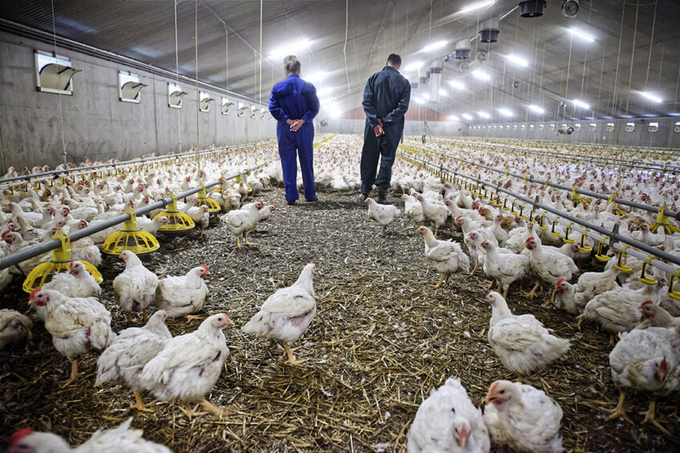May 21, 2025 | 23:22 GMT +7
May 21, 2025 | 23:22 GMT +7
Hotline: 0913.378.918
May 21, 2025 | 23:22 GMT +7
Hotline: 0913.378.918

Bentley concluded that severe coccidiosis was not commonly observed in slower-growing breeds but that producers should check for mild subclinical coccidiosis at older ages. Photo: Lex Salverda
Change was in the air at this year’s Northern Broiler Conference in North Yorkshire, with topics on the agenda ranging from gut health and coccidiosis control for slower-growing broilers, to insects as animal feed and coping with economic pressures.
Future research and development in slower-growing breeds will focus on the European Chicken Commitment and the Dutch ‘Beter Leven’ (Better Life label) 56-day winter garden production system in the Netherlands.
James Bentley, Hubbard Breeders global technical director, said these 2 are the main volume sectors growing in Northern Europe, with 340 companies now signed up to the European Chicken Commitment, including Marks and Spencer with its Oakham Gold range, with others waiting to decide by the end of the year.
Coccidiosis management
Bentley said there was more opportunity for coccidiosis to take hold in slower-growing breeds, so good management was key, especially in the first week, with a focus on the birds’ appetite and water intake with more water nipples per number of birds compared to conventional production.
Commenting on crop fill targets, Bentley suggested they should be at least 80% 8 hours after placement and 96% within 24 hours of placement.
One degree extra
Chicks should be housed with a slightly higher ambient temperature at day one (+1°C) with a targeted vent temperature of 39.5-40.5°C. For free-range systems, the ambient temperature needs to be reduced more quickly to reach a target of 23°C at 21 days.
Sometimes there is a risk that the litter may be too dry due to the lower density and body mass of the birds, so producers should think about changing the ventilation profile based on the smaller number of birds in the house, longer growing period and growth curve.
Bentley urged producers to carry out sample weighing so that bird growth can be monitored at key ages and management adjusted if they are not growing correctly. Changes should be made based on body weight and not age. With birds going to 56 days there is more time for the feed intake factor to take hold. For example, when looking at costs in an organic setting, is there a penalty for overweight birds?
Farmers could consider vaccinating against Gumboro, and for some in Eastern and Central Europe to combat Marek’s disease. However, figures from the Netherlands show the percentage of flocks not treated with antibiotics last year among slower-growing breeds was 97% compared with 72% for conventional flocks.
Interestingly, the percentage of slower-growing chicks has risen from just 8.4% in 2014 to 55.4% last year. So, how does this management affect coccidiosis in slower-growing birds? Bentley quoted 2 papers by Giles and others that showed that conventional versus slower-growth genotypes have different gene expression profiles in response to the coccidiosis challenge.
There is faster tissue repair in conventional birds and slow-growing birds provide more immunosuppression early in the infection. There are also different responses to E. Maxima challenge at 13 days post-infection, with lower detection of the E. Maxima genome in slower-growing breeds. This suggests these birds had a smaller load of E. Maxima.
Subclinical coccidiosis at a later age
Bentley concluded that severe coccidiosis was not commonly observed in slower-growing breeds but that producers should check for mild subclinical coccidiosis at older ages (36-40 days), rather than the 22-28 days for conventional broilers.
Evidence of mild coccidiosis ranges from wetter litter (but this was not always significant), more flock-to-flock variation (especially in FCR) and poor uniformity, with downgrades in some flocks.
(PW)

(VAN) Attempts to bring down the price of the Japanese staple have had little effect amid a cost-of-living crisis.

(VAN) Fourth most important food crop in peril as Latin America and Caribbean suffer from slow-onset climate disaster.

(VAN) Shifting market dynamics and the noise around new legislation has propelled Trouw Nutrition’s research around early life nutrition in poultry. Today, it continues to be a key area of research.

(VAN) India is concerned about its food security and the livelihoods of its farmers if more US food imports are allowed.

(VAN) FAO's Director-General emphasises the need to work together to transform agrifood systems.

(VAN) Europe is facing its worst outbreak of foot-and-mouth since the start of the century.

(VAN) The central authorities, in early April, released a 10-year plan for rural vitalization.